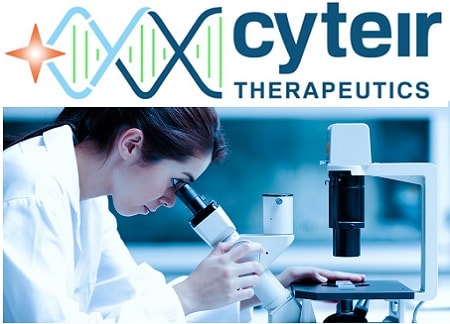Cyteir Therapeutics, Inc., a leader in the development of novel therapeutics based on the biology of DNA repair and synthetic lethality announced the publication of pre-clinical in vivo data demonstrating that therapeutic targeting of the AID/RAD51 axis in B cells may block development of type 1 diabetes (T1D) in the June issue of The Journal of Immunology.
This work was carried out in collaboration with The Jackson Laboratory (Bar Harbor, Maine), and Virginia Tech (Blacksburg, Virginia). Kevin Mills, PhD., Chief Scientific Officer of Cyteir is an author on the paper. Cyteir holds an exclusive license from The Jackson Laboratory for certain intellectual property related to synthetic lethality. The title of the paper is: Genetic and Small Molecule Disruption of the AID/RAD51 Axis Similarly Protects Nonobese Diabetic Mice from Type 1 Diabetes through Expansion of Regulatory B Lymphocytes. The Journal of Immunology, June 1, 2017, www.jimmunol.org/cgi/doi/10.4049/jimmunol.1700024.
“These preclinical data demonstrate the exciting potential of RAD51 modulators to precisely eliminate pathogenic B cells. The discovery that targeting the AID/RAD51 axis causes the appearance of disease-protective cells is tremendously important. We believe this is the first demonstration of a synthetic lethal approach to treating autoimmune disease, paving the way to new methods of treatment in a range of indications,” said Cyteir co-author, Dr. Mills.
Cyteir’s approach leverages activation induced cytidine deaminase (AID) as both a biomarker and driver of DNA damage. By modulating the DNA repair protein RAD51 in AID-positive cells, Cyteir seeks to induce selective self-destruction of cancer cells or specific B-cells in autoimmune diseases. Preclinical studies to date have demonstrated Cyteir’s early RAD51 modulators to be potent, selective for AID-positive cells, effective against cancer cells in vitro and in vivo, and well tolerated in preclinical animal models. In autoimmune diseases, AID is directly implicated in disease development and progression, thus the use of a RAD51 modulator may have utility in mitigating autoimmune diseases as exemplified in the data presented in The Journal of Immunology peer reviewed scientific article.
The preclinical data presented are from a series of experiments using non-obese diabetic (NOD) mice, a preclinical model of human type 1/juvenile diabetes. The study showed that treatment with a RAD51 modulator, which blocks the transport of RAD51 into the nucleus of AID+ cells, greatly reduced the incidence of T1D in these animals. The study also found that targeting RAD51 significantly increased CD73+ B cells in the spleen pancreatic lymph nodes and pancreatic islets in treated mice. These cells were capable of suppressing diabetogenic T cell responses thus enhancing the therapeutic effect of the RAD51 targeted compound. These results were achieved with intermittent and long term dosing which appeared well tolerated by the animals.
“Cyteir has been optimizing its lead RAD51 compounds in order to identify a clinical candidate for cancers and has a wealth of efficacy, safety and mechanistic data around its lead compounds. The data presented in this scientific publication further demonstrates the wider potential for our compounds in autoimmune diseases like T1D, lupus, multiple sclerosis, GI inflammatory disorders, psoriasis, GVHD, and orphan drug indications like inflammatory demyelinating neuropathies and inflammatory myopathies where AID is a driver of B-cell pathogenesis,” said Donald F. Corcoran, President and Chief Executive Officer of Cyteir. “We are strategically evaluating how we take advantage and develop these multiple indications for potential use of our compounds.”
It is estimated by the American Diabetes Association that there are 1.25 million children and adults in the US who have type 1 diabetes and have an unmet medical need for new therapies. Overall the incidence of autoimmune disease is rapidly rising in the United States. The National Institutes of Health now estimates that more than 23 million Americans suffer from autoimmune disorders.
About Cyteir
Cyteir Therapeutics is a leader in the discovery and development of novel therapeutics based on the biology of DNA repair and synthetic lethality for the treatment of cancer and autoimmune diseases. Our initial approach takes advantage of the gain in function from DNA damage overload to induce selective self-destruction of cells by targeting disease-induce RAD51 transport. Our lead molecules were initially discovered using our drug discovery platform using primary cells which contain tunable genetic constraints. www.cyteir.com
Contacts
Donald F. Corcoran
President and CEO
Cyteir Therapeutics, Inc.
857-285-4142
donald.corcoran@cyteir.com
Media Contact:
MacDougall Biomedical Communications
Kara Mazey, 781-235-3060
kmazey@macbiocom.com


















